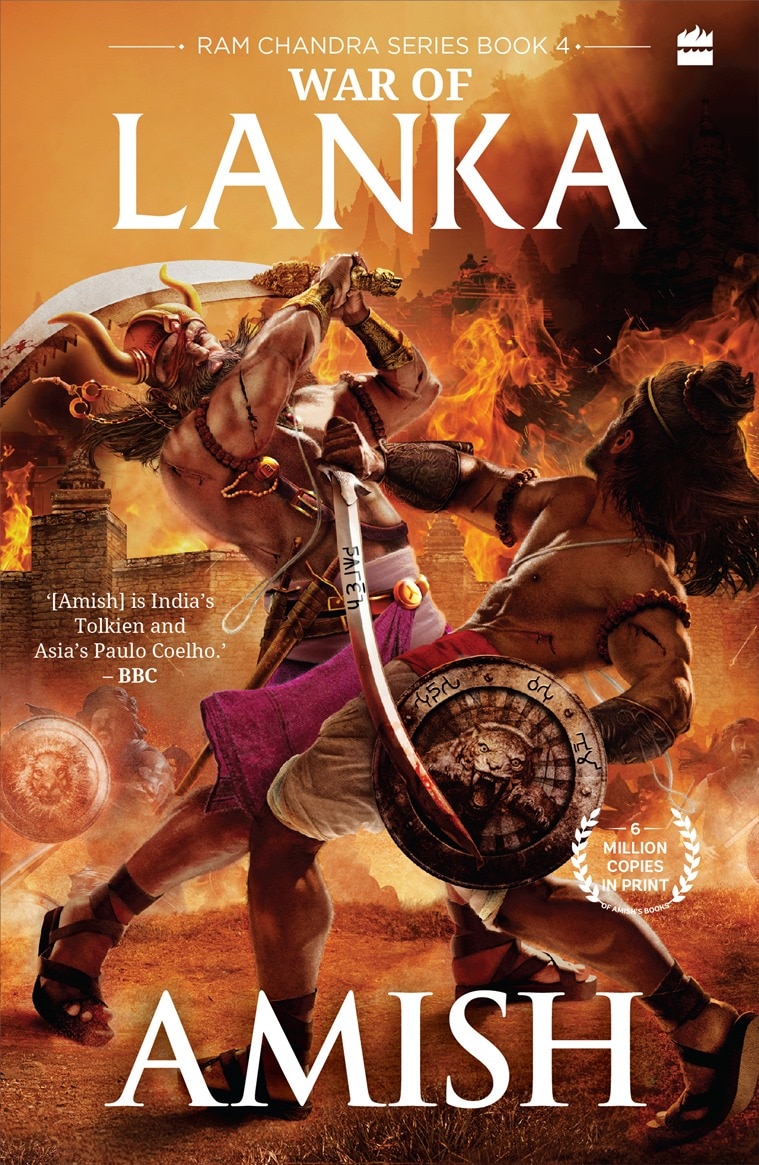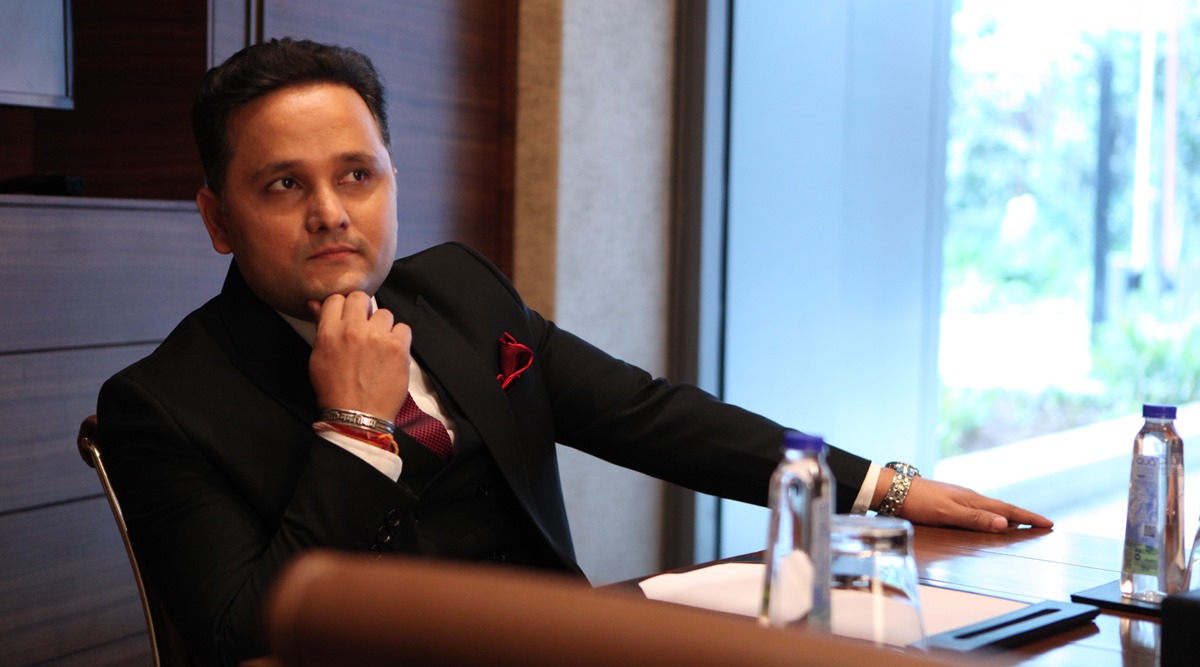Amish Tripathi, one of India’s best-selling authors in English, accepts few compliments sent his way. “Thanks to Lord Shiva,” is a frequent refrain punctuating his answers in interviews, whether the discussion on hand is his writing technique and sources of inspiration, or the good fortune gracing his personal and professional lives. War of Lanka (HarperCollins, Rs 499), the fourth and penultimate installment in the Ram Chandra Series — an action-packed reimagining of the myth of Ram — is out on October 3. In this interview, Tripathi speaks of his motivation for the series, his take on mythologies meeting histories, and the precarious ground book publishing stands on today. Edited excerpts:
The Ram Chandra series is a prequel to the Shiva Trilogy. How did you decide this would be your next project?

The Ram Chandra series had clues of the story placed in the original Shiva Trilogy, which takes place 1,500 years later. After that series was over, I couldn’t decide what to write for several months. Then I went to a lit fest in Mumbai in 2013 and someone spoke quite rudely about Lord Ram. Maybe that incident was meant to happen to me, because I began writing the series the next day.
Buy Now | Our best subscription plan now has a special price
This is the fourth book in a five-book series. How far ahead do you plot a series? Do you plot a single book or do you write without a plan?
In some ways, I don’t plan it at all, in others, I do. My first book, The Immortals of Meluha (2010), took four-five years to write and was published in 2010. War of Lanka is releasing 12 years later. Nobody will believe that I planned this entire thing. I go by instinct, but the ending of the book, down to its last paragraph, is very clear in my mind. I’m an instinctive writer, I use no excel sheets or flowcharts to plan the story.
 ‘War of Lanka’ is the fourth and penultimate installment in the Ram Chandra Series. (Photo: HarperCollins)
‘War of Lanka’ is the fourth and penultimate installment in the Ram Chandra Series. (Photo: HarperCollins)
One reason behind your success has been how accessible your books are. Is that a deliberate choice? Is there any merit in the distinctions drawn between literary and popular fiction?
In India, the gods among writers are Valmiki and Ved Vyas. Valmiki was very poetic in The Ramayana. On the other hand, Ved Vyas wrote The Mahabharata with more focus on the story and philosophy, not a play of words. It depends on your purpose.
The mistake that Western publishers make is that they put value judgements on books, saying literary fiction is high quality and genre fiction is for the masses, which itself is a racist and elitist thought. This is the colonial approach. Things were different in ancient India. It wasn’t that The Ramayana was for the classes and The Mahabharata for the masses.
How do you approach writing characters? Are you apprehensive of giving your own take to mythological characters cherished by millions?
If one wants to write a book on mythology, there’s no better country than India and no better area than dharma — because the dharmic religions of Hinduism, Jainism, Buddhism and Sikhism didn’t have a concept of blasphemy. There are multiple truths in our way of life. In north India, Lord Kartik is considered older than Ganesh, in south India it’s the other way around. India is intuitively very liberal. If you write your interpretation with respect, most Indians can see that. Then, there will be no controversy.
Mythology and fiction come together in your work. In light of recent petitions to investigate mosques for signs of destroyed temples underneath, historians have claimed that some of these claims are exaggerated. How do you differentiate between a scholarly investigation into such claims and what might be a bigoted agenda?
Many historical claims in the West are being reinvestigated, with deeper scholarly analysis. For example, the British Raj is being seen in a new light, and not as a relatively benign force as it was seen earlier. The legacy of Cecil Rhodes is being challenged as he was a slave owner, who committed massive crimes in Africa. Yale University is named after Elihu Yale — again a slave trader — and the name is facing scrutiny. But in the West, much of this conversation has been surrounded by a lot of anger, which I think is avoidable. These conversations must happen calmly, without targeting the descendants or communities of the historical criminals, as that is wrong. Similar calm and scholarly investigation should be done on Indian history. Truth is the best disinfectant to historical and community divisions.
Most Read 1Leo box office collection Day 1: Vijay-starrer delivers biggest global opening of 2023, beats Jawan, Adipurush and Jailer 2Leo box office collection Day 1 early reports: Vijay’s film to record biggest Tamil film opening of 2023, brings in Rs 145 crore worldwide 3Why Egypt and other Arab countries are unwilling to take in Palestinian refugees from Gaza 4Pimpri Chinchwad cop who won Rs 1.5 crore on fantasy cricket platform suspended, to face departmental inquiry now 5When Anushka Sharma said marriage is ‘very important’ for her: ‘I want to have kids and probably don’t want to work’
Your earlier publisher, Westland, was shut down by Amazon recently due to business reasons. Amazon has come under fire for monopolising bookselling and has faced off against publishers globally, too. What’s your take on this, and on independent booksellers not getting enough room?
The industry is passing through a good and bad phase. There are relatively few bookstores in India. As rental prices have risen, many bookstores are finding it difficult to survive. GST has made life difficult because the industry is exempt from GST. Online distribution has helped books reach even places which have no bookstores, but has also made piracy much easier. The MNC publishers, indie publishers, regional language publishers, all work separately. We’re internally very divided so can’t put across our case effectively. We need to be more united.
Also ReadFive books to read on the Israel-Palestine conflictSalman Rushdie to write memoir on knife attackSaadat Hasan Manto: Remembering the literary legacy of the playwright and…The Armory Square Prize for South Asian Literature in Translation release…
📣 For more lifestyle news, follow us on Instagram | Twitter | Facebook and don’t miss out on the latest updates!



